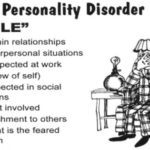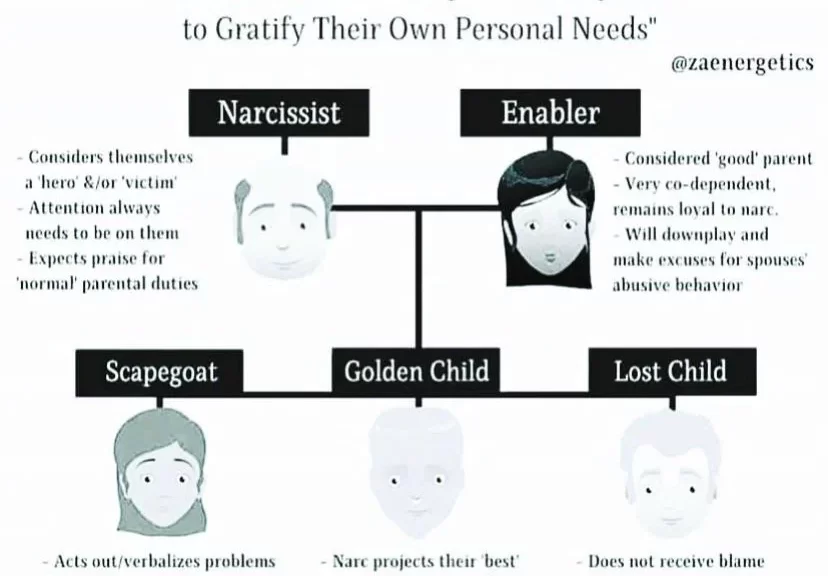
Narcissism Series: Diagnosis, Their Weapons, Family Dynamic & Solutions
Disclaimer: I am not a professional in this subject. I am only sharing what I have discovered from books, videos and articles by other professionals. I have included links or sources where possible.
Narcissism Part 1 – Diagnosis and Behaviours
Narcissism Part 2 – Tactics and Weapons
Narcissism Part 3 – Family Dynamic: Golden Child, Scapegoat, Mascots, Flying Monkeys
Narcissism Part 4 – Solutions Like No Contact & Grey Rock | Bonus – Covert Narcs
Related links:
Boundaries, Ethics, Forgiveness, Individuation
The Drama of the Gifted Child Book Summary
Avoidant Personality Disorder
Hypervigilance
Dealing with Blame
End of Victimhood
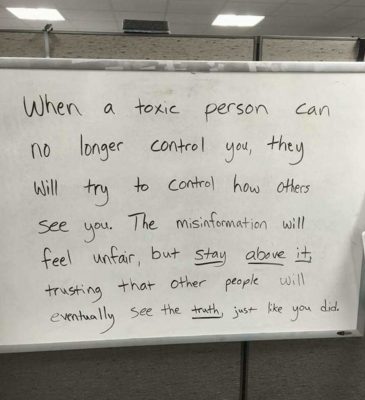
Red Flags
Remember because of their personality they will most likely not admit to it or tear you down even further when you try to help. Clinically, narcissism is a rare diagnosis. Men used to be more likely to be narcissists than women but recently we’re seeing a big and disturbing change.
– They were entirely different people at the beginning of the relationship.
– You’re made to feel special. That usually happens rather quickly. They proclaim their love for you—and very fast, too. Paras note: I found this description funny because it’s true – They’re like the stereotypical used car salesmen or saleswomen of relationships. (From Shrink4men.com)
– Narcissists try to isolate you from friends and family. They go behind your back and trash talk you or play sides against each other all the time. All while making themselves look good or like the hero.
– They’re master manipulators, and they feel a deep sense of entitlement. Rules don’t apply to them, because they’re just so superior to the rest. (They think they’re the next Steve Jobs).
– Narcissists have fragile egos. Grandiosity and a lack of shame or remorse or empathy are certain key components of narcissism. A good question to ask is if someone has a very fragile sense of self or deep-seated insecurities. Those insecurities often show up in the narcissist’s social behaviours.
– They’re very quick to align themselves with organizations [or] people that would be high in status—the best of the best. They have a need for admiration. Stealing credit or solely taking credit for the achievement of the team.
– If my ego is fragile, I need a lot of other opinions to bolster my sense of self, so underneath all of that grandiosity is a pretty low and fractured sense of self-worth. And a lot of shame, usually. People with narcissistic disorders often overcompensate for that shame by bragging about the ways that they’re superior to others. Those beliefs are real—but fragile.
– They might go on and on about how great they are, or how much this person likes them, or that person likes them, or they got accepted into a certain organisation. They’re really aligning themselves with anything that further capitulates their fantasies around fame, or importance, or superiority, or just being great.
– They have an inflated opinion of their partners. They require tremendous amounts of attention. Narcissists are fixated on envy.
– Another obvious sign is that they love talking about themselves or stealing others stories so they are the ones presenting the story. Instead of sharing and listening to you, they’re emotionally evasive and expect you to save your breath for reinforcing their specialness.
– Getting really fixated on envy, and they often think that people are jealous of them. They can live in a kind of a hot bed of their own envy towards other people, because they’re constantly comparing themselves to others to derive a sense of self. They can be really haughty, arrogant, or dismissive while devaluing of other people.
– They push against your personal boundaries. Fix your boundaries Deep Inner Game
Some phases to recognise the Narcissist in your relationship.
– They’ll make you feel special. Since they feel they’re special, only other special people can understand them. Over time though, this feeling will carry less weight. You’ll start to feel like they don’t even really know you, mainly because you don’t spend much time talking about yourself.
– If you just meet someone and they start telling you straight away that they love you and you’re amazing and you’re the most beautiful person in the world, the most incredible partner that they’ve ever met—it’s just all about kind of inflated, kind of fantastical thinking and projection—that’s a pretty big red flag.
– When a narcissist stops receiving the kind of positive feedback they need to satisfy their insecurities, they can quickly change. Suddenly, that loving partner might become an enemy.
– They will do the ‘shame rage’ – If they make a mistake, they put other people down to try to make themselves feel better. A big indication that you’re in the presence of a narcissist.
– Over time, they’ll demand more attention from their partners that can manifest in insidious ways.
– Gradually turn against their partners, eventually becoming negative or even outright hostile towards them.
– In the cycle they idealise a partner or friend. Then, the minute there’s some kind of falter in the fantasy of who that person is, they devalue them—almost knocking their knees out from under them—and then discard them. It’s a defence mechanism for them. ‘You’re amazing…but if you stop being amazing for whatever reason, you’re no longer someone that I want to align my star with. So you’re useless to me.’
– They will often push your boundaries and try to get you to show up more for them than you want to initially e.g. compel their partner to make sacrifices or major commitments early in a relationship. Refuse and you’ll likely experience some negative consequences, potentially including verbal and emotional abuse.
– You have to be prepared not to provide the ‘supply’ they need all the time, or be prepared to lose yourself.
Narcissist’s Poisonous Rage
The Varieties of Narcissistic Rage
The 3 Stages
Idealise: Love bombing. At this stage sometimes you’ll witness the rage episodes. Excuses or pretending it didn’t happen are the norm. Remember they’re building you up at this stage to tear you down later. Easy targets are people who didn’t get love and validation from parents. Recent loss. You have the 3 N’s: Nice, naive, non-confrontational.
Devalue: This is where you become the reason for the rages. They are testing their limits. You held them back, you didn’t give them the support they needed. They weren’t giving anything to you though and if they did they only gave to get something back. They are bored because of stability. They need a distraction like conflict, lawsuits, affairs, swindles, etc.
Discard: Sometimes takes a few decades but it does happen. You’ve seen too much. Promises of better things if you give more, do more, sacrifice more (future faking). If you tell them that they’re being abusive in any way, they will feel bad and you know what happens when they feel bad. Once they find a new fresh supply it’s over. By now you should be gone… ghost! No form of contact in any way as they will constantly find ways to get to you. See supply below.

Types of Narcs
Exhibitionist – Look at me. Always look at what I’m doing. I’m so much better in looks, deeds, life, etc.
Covert – Hidden ones. Angels and celebrities in public but a monster in private. Victims and lawyers of their mistakes and judges of others. Passive aggressive. They’ll share links of how they have depression when they’ve done something foul and cry to get attention when they have been fouled. Keep reading for red-flags and solutions. Youtube link.
Toxic/overt – No empathy for the destruction they leave. They hate drama but always in the centre of it. Always putting people down.
Predatory – Using weakness and flaws of others they will hurt you as bad as they can. They plot and plan, practice their schemes and scripts.
It is ALWAYS about Supply
– They have an empty hole that they continuously need to fill. Which is why they create so much drama, havoc, confusion, focus on negativity in others or the world (disguised as care, love, concern, awareness).
– If they stop the supply they’ll have to look at themselves and their flaws which they can’t stand so they need to deflect it. They could degrade you to others and/or make themselves look like a hero.
– Whenever there is a quietness remember that it’s the calm before a storm and they’ll pick the holidays or special days to really get to you. This is the biggest red flag. Say it’s your birthday, that is when they decide to call you to give you bad news or the cheapest gift they could find.
– They can be pretty antagonistic. Negative attention is better than no attention. The thing that would get to the narcissist’s core the quickest is being irrelevant, and when we don’t give a narcissist attention, they feel irrelevant. Often, they can get provocative and antagonistic as a way to at least secure that attention.
– To a narcissist, the line between “positive” and “negative” attention might be razor thin. Narcissists often behave in less agreeable ways than non-narcissists, particularly when they have low self-esteem.
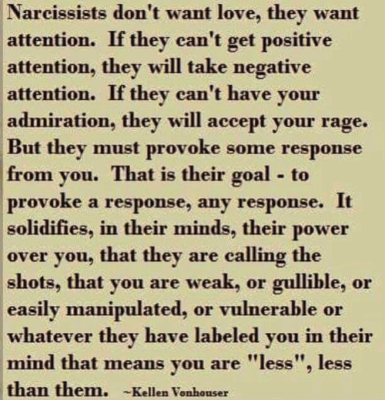
– They can be a hero or they can be a villain. It doesn’t really matter. As long as they’re getting that supply. It’s not just about violating rules so much as it’s about just doing whatever they can to stay relevant and in the ‘front of mind’.
– All they want is reactions. They’ll come into a meeting and say something outrageous to get their hit. Got a haircut? Oh you look like a melon. He needs to be remembered. Even though they are addicted to admiration and respect from others, any reaction or attention helps them to exist.
– Showing others how awesome their life is and rubbing it in peoples faces as much as they can.
– They cannot stand any independence from their ‘supply’. Paras note: I recently witnessed a split in a relationship because the ‘supply’ started doing activities on their own, making friends who were not mutual and basically being true to themselves. The ‘vampire’ could not stand it.
– Supply can come from the ability to talk about how they know well known people, rich people, political powers and celebrities. Name dropping.
– They get bored and cold very quickly. This is where they will go back to their old supply. Why? Well the same reason they loved you, all your amazing qualities they flamboyantly talked to others about, are going to be used against you. You won’t know what hit you!
There are 2 main sources of supply:
Primary Narcissistic Supply (PNS) – anyone or anything that can provide attention. Public fame or infamy, private admiration or hate. It can be a random and causal supply.
Secondary Narcissistic Supply (SNS) – more regular supply. People they see everyday. This supply needs to be positive and any show in negativity will have the supply cut off in the worst ways. This is a reserve for when PNS runs short.
2 Phases they feel depending on their supply:
Euphoric – they feel elated and well-being.
Dysphoric – sad, anxious, restless, irritated.
– The cycle carries on until loss of PNS or SNS will create dysphoria. They will display rage and will try to find control. Detaches and goes into fantasy using messengers to communicate for him. They will move into narcissistic hibernation (depressive cycle). They will start to feel a change that will heal, make them feel in control again and then look for the next achievement. Vaknin calls this the Reactive Repertoire.

Triangulation
– Most likely when they find a new supply they will use them to discard you. They will find any pawn to play their game as the pawn doesn’t know they are being played. This usually means playing the hero-angel card. I’m doing this out of love so please help me and be my messenger for peace, love and unity dear pawn.
– Roles in the Triangle: Victim, Persecutor, Rescuer. In the narcissist’s version, he is the victim but in reality, he is the persecutor. At some point, the old supply, without knowing, tried to ‘rescue’ the ‘victim’.
– They take over the communication in the triangle and lie between parties to create a distance and then play both sides as they want. They control the conflict and love watching it.
– They’ll always find a scapegoat and talk about how concerned they are about the scapegoat.
– Another form of triangulation is when the parent will give very little to selected children in the will or give most of it to one child. Even on their way out they need that supply.
– They try to involve other people to make you jealous. Flirting or talking on the phone with someone else while you’re there.
– You can see this blatantly on social media these days. Especially when 2 narcissists are in a relationship together. Both are feeding off each other having conversations with each other in public. Taking over group chats and making it about them. In these cases it’s pretty obvious what a circus they are in.

Gaslighting
– Not remembering when they did something wrong. The forgetful card is always up their sleeve or very selective memories.
– Making you think you didn’t say something or insist on a different version.
– Done to protect them, embarrass you, not to face the truth, to make you seem crazy.
– They can start by telling the person that their emotions were totally wrong. ‘You were so brainwashed by the other parent so I couldn’t talk to you’. They will question your sanity or make you question your sanity and make you doubt yourself. Using repetition of the same wrong story told over and over again.
– FORGETFULNESS! Oh did I make that promise? I don’t think I did.
– They’ll make you like or make you stay quiet.
– They use your fears and take note of your vulnerabilities. E.g. ‘you’re so sensitive, just relax’.
– They will say that they know you so well. E.g. a father telling the child they don’t spend time with that they know them so well and have people informing him of the child’s behaviour and activities.
Solution to Gaslighting
– Understand the 3 stages:
Disbelief: You don’t want to acknowledge that the gaslighter is doing something wrong to you.
Defence: You defend yourself and sanity and can be in this stage for a long time. If only they see the truth but they wont because they don’t want to see you as a good person.
Depression: You give up and let them control your reality. Don’t participate in it.
– Demand to stand on your views and stay defiant. You can also walk away after restating your side.
– There will never be accountability. They will never say sorry or acknowledge it.
– Let go for the wish for it to be different.
– Develop healthy detachment.
– Tell the gaslighter that if you can’t acknowledge the truth or answer my questions correctly you are not going to be in my reality for long.
– Don’t try to figure out what was true.
– Keep a record of everything! Messages, emails, texts, pictures, audio, video.
– Say that you can see how they see it that way but this is how you see it.
– Broken record technique. Use their own technique. But also remember that what they think and say is irrelevant so don’t let it bother you if you can. Otherwise stick to the topic until it’s clearly acknowledged.
– Tell them to stop it clearly. ‘Hey I know you think I’m sensitive but this is really bothering me and I would like you to stop it’.
Ghosting: Every now and then they will go silent. Especially when you stand up to your boundaries and they don’t have another supply. They want to show that they’re thinking and later they’ll come with some lies. Most of the time when they open their mouth… don’t believe it!
Hoovering – This is when you get ‘sucked’ back into a persons dramas. Usually after a time of no contact. It’s a way to get back supply and control over the victims. Examples are: I’ve changed, give me a second chance. I’m not in a good place and need you help, please! Gifts and praises. They’ll pretend that the relationship isn’t over or you will always be so and so to them.

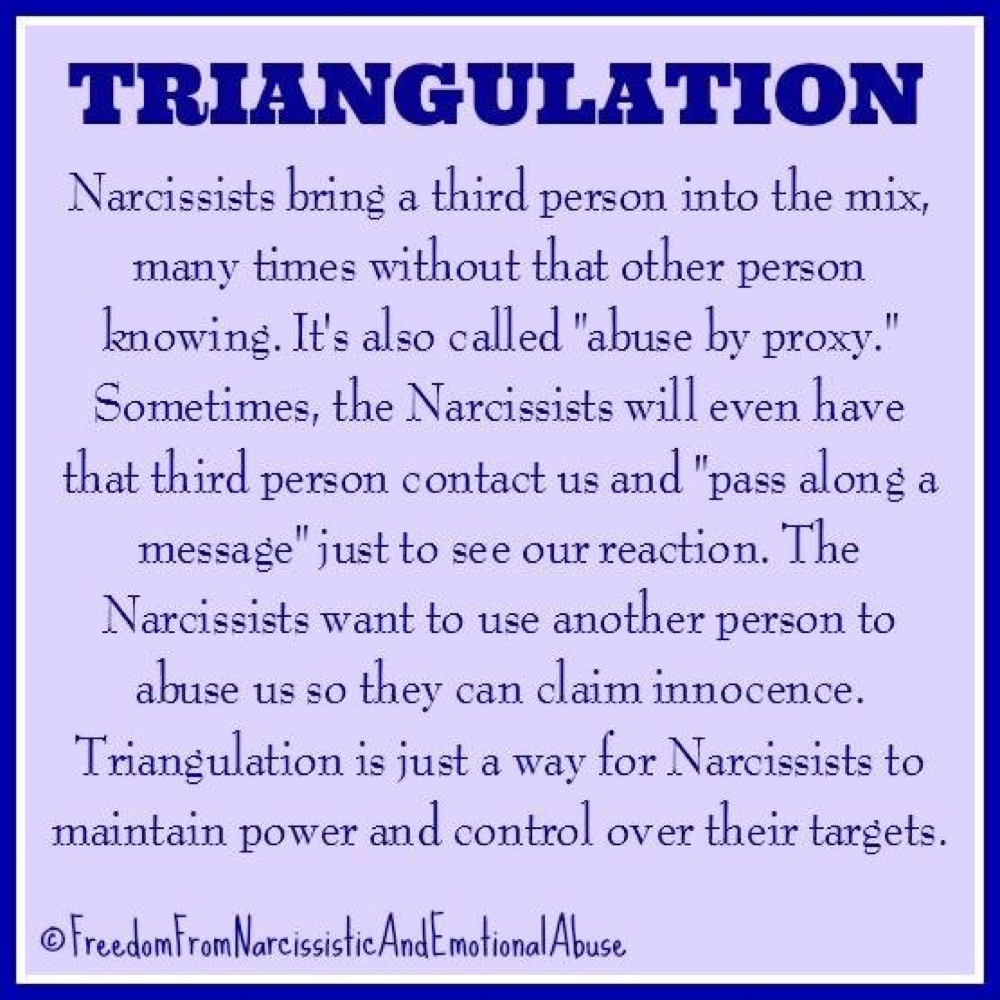
The Toxic Family Structure in a Narcissistic Household
(Remember all the roles can be fluid but usually roles are pretty sticky)
Narcissist Parent: Narcs think in black and white so someone is all good or all bad because that’s is how their personality flips. Hence grooming the golden child and scapegoat and projection splitting their good and bad qualities respectively. Will groom the children to set them up for their supply. The golden child will be the one providing not only the unconditional supply of love but will also groom the scapegoat to be the punching bag for both of their supplies. They will play the children against each other for supply. They want to control everything e.g. if a child gave money to charity the child should have said it was in their name or should have got their blessings. They won’t care to hear what you want to say or who you are, they want you to be what their ideal image is. They won’t be there for the child’s activities and even birth. This makes both children feel an emptiness and trying to fill it not knowing that they will most likely never get what they need from the parent. Narc and golden child are constantly brown nosing each other. They set up the children to constantly fight with each other or have a lifetime of conflict. They are in competition with the children e.g. if a child sends the parent a video of them singing the parent who likes singing too will point out that the pitch was too high instead of patting their back for performing in public. At the same time, they will try and hide the video of you singing but if people point it out then it’s like yes that’s my child or gets it from me. They need to make the child feel helpless or not be able to live without them. Ever admit when wrong or say sorry and instead gaslight you (see below). Guilt trips, conditional love, no boundaries, jealousy, drama, etc.
Narcissistic Parents: Effect of Fathers on their Children – Part 1
Narcissistic Parents: Effects of Fathers on their Children – Part 2
The Golden Child / The Chosen One: The robot. Will do the narcs bidding, tells the narc what they want to hear. Will make the scapegoat think they are ungrateful and undeserving. ‘Your parents did so much for you and all you do is speak the truth!’. Dad built all this for you and you didn’t take it. Has hidden hate and jealousy for the scapegoat as somehow the scapegoat is always loved. Could also be because the narc and golden child both need the scapegoat to suck their supply from. Gets everything while helping the narc show the world how they did so much and tried to save the scapegoat. This child deserves to go to uni. Unfortunately, the golden child doesn’t really have a golden life as this role is the biggest puppeteering act in the whole circus. They can’t do, speak, look, be authentic to themselves as they do exactly what would please the narc. They are more like parrots copying other people. If they don’t figure things out early it will hit them suddenly that they don’t know who they are so they stick to the parent’s principles even if they are not morally right. The world is not telling them how awesome they are like how the narc was. They end up showing signs of narcissism and usually get full-blown in adulthood and turn into another empty shell trying to fill the hole with money and fame.
Covert Narcissistic Siblings – Psychological Predators/Angels in Disguise
Narcissistic Brother: Cock of the Walk
Should the scapegoat child trust the golden child?

Scapegoat / Black-sheep: The rebel. Always seeing out justice, being the truth-teller, speaks against authority, says what the narc does not want to hear. (The other roles are going to point out all these qualities as bad in you). If you do well, the narc will put you down as you can’t do better than the golden child. You don’t mind being the only one that says the Emperor really doesn’t have any clothes on. You will never feel deserving, you will usually be awkward and not do things right. Because you have this self view of not being able to do things right, you will do more things that are not right. It’s a vicious circle. Gets minimal even if that while the narc will show the world how much they did for the scapegoat. This child is told they are not worthy to go to uni and are not even ‘diploma material’. They are authentic to themselves but are compared to the golden child and are told to be more like the golden child. Emotions get numbed out even if they feel something because of all the trauma, birthdays are just other days, presents are gifts but thats it. The scapegoat has a better chance of healing and escaping the circus. Once you escape, the household will self-destruct.
Solution: One big thing you need to do is stop acting like a victim (Keep an eye on this link for more information). Remember scapegoats show all their cards easily so keep this in mind too as you are giving away power. Don’t truth tell all the time, choose your moments. Look into ‘pain body’, ’emotional body’. Stop trying to make the Golden Child see how bad you’re being treated or anyone else for that matter as it will just been another way to suck the supply out of you.
The Lost Child: They are nowhere. No praise is given, no blame given. They leave the house and come whenever and nobody notices.
Audience / Little Helpers / Flying Monkeys / Enablers: Used for triangulation, bonus supply. Giving the narc what they want. They usually won’t even know they are playing that role. They just thrive to keep the narc happy.
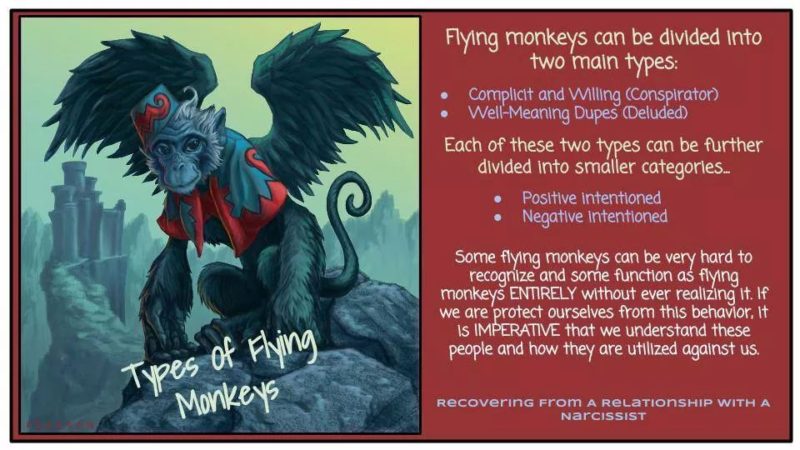
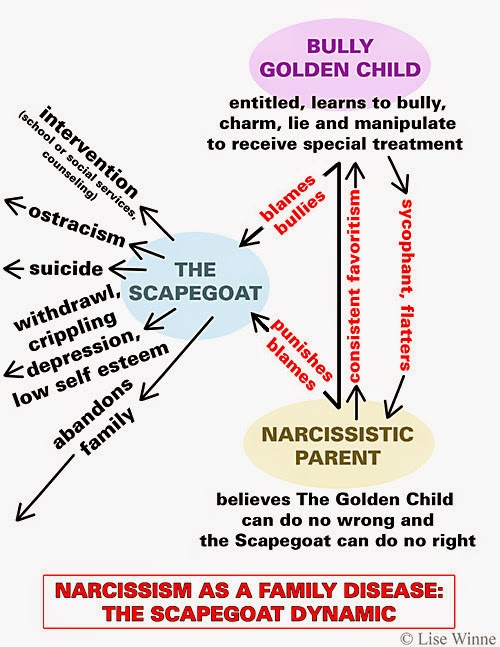
Solutions & Healing
– If you’re going to be in a relationship with a narcissist seek professional help and you have to have solid boundaries (Fix your boundaries Deep Inner Game ). You have to be willing to enforce them, and you have to not get caught up in the guilt that can come with enforcement. It can be managed if they’re willing to commit to long-term therapy.
– If you feel you’ve experienced trauma and not being true to yourself I highly recommend this summary – The Drama of the Gifted Child – The Search for the True Self by Alice Miller
– Talk to them with direct eye contact. Say what you want to say firmly but not harshly. When they go off topic bring them back. Ask them to put themselves in the feet of others to experience empathy. Don’t try to appeal to an empathy that isn’t there.
– As someone who was a victim of narcissistic abuse you may have avoidant personality disorder or hyper-vigilant as a self-defence system. I highly recommending looking into this signs and symptoms to see if you can find solutions for it.
– Don’t tell them too much as they’ll use this in the future. ‘You were like this in the past and thats who you still are.’
– Know that whatever they are saying to you or pointing fingers at is what they are. How to deal or not deal with Blame
– Do not try to explain to them when they misunderstand you. They react to their own emotions and will be offended by you just being happy. They will get upset if you serve them tea the wrong way because in their own head they’re hating on themselves.
– Again don’t try to explain or justify as you’ll notice that they’re not really hearing you. They pretend to listen but they only hear whatever is happening to them.
– Transforming Emotions Meditation. Paras note: One of my go to meditations when I need to sort out emotions.
– Find ways to stop being the victim. (Keep an eye on this link for more information)
– Since your brain is always going between past and future and takes active work to stay in the present. Focus first on the breath to come back to the present and notice the breath and moment. Next is to tell your brain that every time it goes into the past and future it has to look at what is unresolved in the past and what solutions there are in the present it to be a better future. Do this while meditating, while falling asleep, keep talking to your consciousness to help you and it will.
– Also if you keep attracting these personalities it could be because you are codependent. This is a big subject itself and I suggest you look into getting over it. Fix your inner game – Deep Inner Game .
No Contact
– This is the best and final solution. Not always possible but if you can you just cut off all ties, unfriend, unfollow, move planet. Just avoid all communication. If this is not possible because of joint custody, shared work areas or anything else, then you need to go for the Grey Rock Method (see below).
Bonus: Don’t Be Afraid To Completely Cut Family Members Out Of Your Life
Grey Rock Method
– It is a way of communication where you encourage the person to lose interest in you.
– Give boring, monotonous responses so that the vampire can’t suck any supply from you. This will condition them to expect boredom and no drama.
– It’s one of the best ways to break up with them.
– Never ask questions. Say things like hmmm, maybe, well see. Discuss safe topics like news, weather, nothing personal. Try to be distracted so you don’t look at them all the time. Don’t let them in your head. Stick to facts and figures. Avoid mentioning the past.
– They will get angry as they’re not used to not getting a predictable reaction from you as they used to. Stay strong, cool, calm, composed even if you’re flipping out inside. This is where they might triangulate to get to you.
Some Phrases to Disarm Them
– I’m sorry you feel that way.
– I can accept your faulty perception of me.
– I have no right to control how you see me.
– I guess I have to accept that that’s how you feel/You’re entitled to your reality.
– Your anger is not my responsibility.
Observe Don’t Absorb Technique Neutralises Narcissistic Abuse. Narcissists Can’t Hurt You with ODA
Covert narc red flags and solutions
– Circular conversations that never end. Lots of meaningless or irrelevant facts.
– Alternating their role from victim to hero.
– Lots of stories about being the vulnerable victim to hook and bait you in. They are always in some dramas… court cases, being screwed over, not listening to advice about staying away from people because they are so trusting. Usually victims would look for a solution. Here they keep the dramas as a way to milk more supply.
– While overt narcs will rub their success in your face, covert narcs will mention things in conversation e.g. talking about the price of things they paid for, sharing the great life they’re living on social media or helping/serving the community just so they can share it online.
– They are very good at pretending to care, to be generous or show their generosity only when they can get attention for it.
– They love being late! They get a lot of supply from knowing that they’ve made people wait for them or bump them around.
– They will rip you apart indirectly and end up make you doubt yourself or your sanity. Using others and turning others against you. Even their friends won’t detect their covert narcissism throughout their lives. You can tell by feeling something missing in the relationship, maybe they’re too something or overcompensate by talking a lot. Remember because they are very envious of others they will find a way to cut others down covertly. Low emotional intelligence and obvious signs of them not listening to you even as they stare right in your face. Targeting people they consider weaker than them. Highly passive-aggressive, planting seeds and letting them grow. Covert narcissism-The more hidden form of narcissism
Solutions to Escape Covert Nacrs
– Do not call them out in public. RUN… Quietly.
– Don’t argue with them. RUN… Quietly.
– Create an exit plan and beware if they find out they’ll destroy your reputation. They have followers who believe in their ‘perfect’ world. RUN… Quietly.
– Connect with people who have your best interest at heart. Run … Quietly.
How Are Narcs Created
– Apart from The Golden Child it starts in childhood or toddlers.
– Physical or emotional abuse or neglect. Parents, also being narcs, are not emotionally available.
– The few emotions that they have they will hold on to.
– They are not taught to be fully rounded. Only noticed when they do something special.
– Brutal super-ego that constantly talks to them how worthless they are. Rejection and neglect from parents is part of it.
– Spoiling a child also helps in the creation and a child can be spoiled and neglected at the same time. Abandoned but given what they want to keep them busy/quiet, which teaches them that they just need to throw tantrums to get what they want.
– Narcs are basically 2 year olds in adult bodies and they were not taught how to deal with their emotions and frustrations.
Hope for the Narc
– There is a very slim chance that they can manage their narcissism. Remember they will never stop being a narc.
– They need to admit that they are behaving like this and not use excuses that that’s just how they are etc.
– They are guided by emotion. Going for their need and want. It’s a reaction to their reaction. They can be conditioned out of it e.g. when a narc hits the partner and they get a dog who protects the victim. The narc stops the violence and after the dog is out of the picture the narc stays non-violent towards the partner.
– They have to dislike their behaviour so much and stay focused on it by not letting impulses override their behaviour.
– They need to be aware that they are avoiding the behaviour and finally they need to actively be aware when that behaviour comes up and replace the behaviour.
– They can change their behaviour but don’t hold your breath. They will still not feel empathy for others or love others.
Narcissists often have trouble with empathy, but they’re not inherently bad people. With therapy, they can treat some of the underlying insecurities that prompt their manipulative or harmful behaviors.
Bonus: Narcissists and their relationship to money – video link They obsess about money as it gives them value, are generous not because they want but because they can get some supply from it. They control the money so much that they won’t let the partner handle money or use it to control the parter. Keeping a close eye on the partner’s spending while being secretive with their own.
Bonus: Scientists Found That Anxiety Disorders Are Linked To Narcissistic Abuse. Kids with at least one emotionally abusive or narcissistic parent are at a higher risk of developing anxiety. Verbal abuse could contribute to great psychological problems and brain damage, like dissociation, anger-hostility, depression, and anxiety in later years. In case you’ve been abused in any way in your childhood, it isn’t your fault. You must be patient with yourself and you’ll finally become a stronger person.
